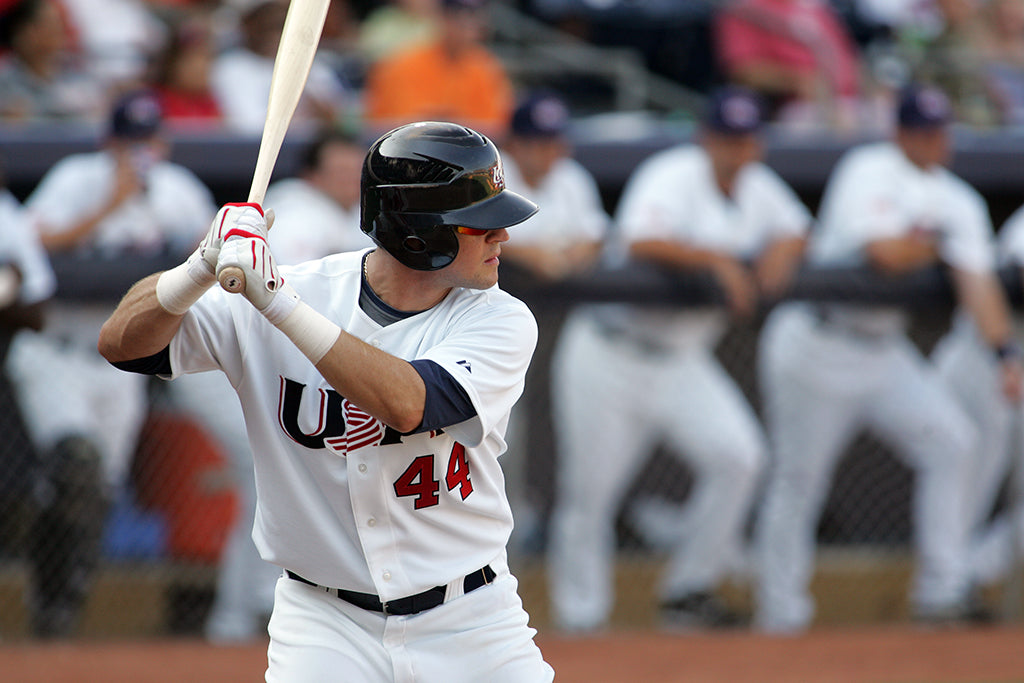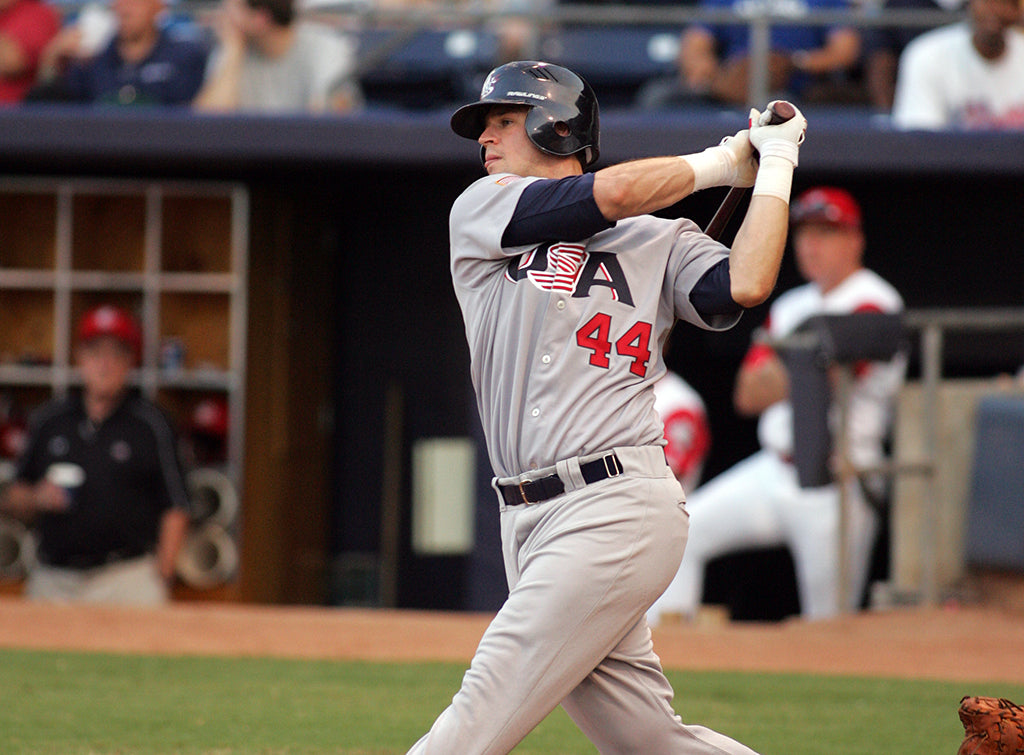Where Are They Now: Rick Ankiel
Rick Ankiel is writing a book.
And it promises to be must read material.
When Hollywood comes looking for its next “feel good” story and personality, they should look no further than Ankiel.
As far as personal stories go, Ankiel’s has the highest of highs and the lowest of lows, and plenty in-between. From pitching on the three different USA Baseball national teams (1996 18U, 1997 Junior Pan American team, 1997 IBAF “AAA” World Junior Championship) to reaching the major leagues as a coveted pitcher before retiring as an outfielder, staying as far away from the mound as he could possibly be.

“I’ll finish the book this year,” Ankiel says. “It’s my story and what I’ve gone through… and there’s definitely a lot of interesting stuff in there, that’s for sure.”
Indeed, there’s a lot the lefthander endured after signing with the St. Louis Cardinals as a second-round draft pick out of Port St. Lucie High School in 1997. He watched his father, the very man who helped teach him baseball, go to federal prison for drug smuggling. He watched as his half-brother was incarcerated 28 times in six years for serious offenses including rape, cocaine possession, drug smuggling and burglary.
But Richard Alexander Ankiel had something they did not – a God-given talent to throw a baseball from the left side.
After his junior year of high school, Rick got his first taste of international baseball when he was selected to the USA Baseball 18U National Team to play in the 1996 “AAA” World Championship tournament in Cuba. He was good, starting one game in which he pitched seven innings for the win, allowing one earned run. After the tournament, he hustled back to Port St. Lucie High to begin fall semester classes, having missed the first week while out of the country.
That trip was eye opening for the 17-year-old. He heard the Cuban fans beat drums, chant in the stands, and rally around their team and country. He saw passion. He also learned the importance of teamwork and listening to those who had experienced this environment before. It’s a lot for a kid to deal with, taking the mound in a foreign country where it seems everyone wants to see Team USA fail.
But Ankiel thrived on it. You want pressure? Try watching your father – a man you love – argue violently with your mother – a woman you love - and you’re virtually helpless to do anything about it. Pitching in another country was miles away from that ugly scene, both physically and figuratively.
And Rick embraced it.
“For me, it was unbelievable,” he says. “It was such a life experience to be able to put a USA Baseball uniform on. It was like nothing I had ever experienced before, and I would never give that opportunity away. From day one, I knew I was representing my country, my family, my school and myself. And I had all my teammates to travel with and play ball with… It was one of the best opportunities I’ve ever had.”
By the spring of 1997, Ankiel was a known commodity with scouts flocking to his games to see firsthand the Florida lefthander with the electric fastball. He also played his second year with the USA Baseball 18U National Team, going 1-0 with a 0.71 ERA and an eye-popping 20 strikeouts in 12 2/3 innings at the Junior Pan American Championships in Brazil where the USA went 6-1, earning a bronze medal. He later posted a 1-0 mark in two appearances in the 1997 IBAF “AAA” World Junior Championships in August in New Brunswick, Canada, fanning 27 in 15 2/3 innings.
“Those were the good ol’ days,” he says.
In between the Pan Am Games and the World Championship tournament in Canada, Ankiel graduated and was drafted by the Cardinals. He did not sign with St. Louis until after returning from the World Championships in late August 1997. Almost two years to the day of signing, he made his major league debut as the youngest player in the big leagues.
It would be easy to say the rest is history and they lived happily ever after, but that’s not quite the case.
In 2000, at the age of 20, Ankiel strung together an outstanding season, going 11-7 with a 3.50 ERA and striking out 194 in 175 innings pitched as he finished second to Rafael Furcal in the NL Rookie of the Year balloting. But he also uncorked 12 wild pitches, a sign of things to come.
Why do pitchers, catchers or even infielders suddenly lose the ability to throw the ball where they want to? What happens when the mind tells you one thing, but the body doesn’t listen? That fall, pitching in his first-ever playoff game – Game 1 of the NL Divisional Series – Ankiel inexplicably lost his ability to function on the mound, becoming the first pitcher in 110 years of major league history to throw five wild pitches in one inning. One. Inning.
After shutting out the Braves for the first two innings, Rick Ankiel lost his way in the third, allowing four runs on two hits with four walks and the five wild pitches.
His pitches sailed wide, sailed high, sailed wide and high, flew to the backstop and bounced several feet in front of the plate. Few actually ever crossed the plate, but Ankiel kept digging deep to try and pull out of sudden disaster. Nothing worked.
He made two other appearances during the Cards’ playoff run, but twice failed to finish an inning against the Mets because of control issues.
The troubles continued the next season, and Ankiel was sent down to try and work it out. Ultimately, he plummeted all the way to rookie level before he found some success on the mound. It was also there, as a designated hitter, that Ankiel began driving the baseball at the plate.
He underwent Tommy John surgery in 2002, and returned to the majors in September 2004. He seemed fine, and pitched fairly well in a few brief relief appearances.
Then during a spring training game in 2005, he again lost it, throwing just three strikes in 20 pitches in one game. Some of it may have come from trying to work through a nerve flair-up in his elbow, but he just couldn’t throw a strike. It seemed like the end of the line.
“I just came to a point where I knew it wasn’t working,” he says. “And I didn’t know what my future would be. I felt like my personality was changing, my relationships were changing with my friends and family, and I realized it wasn’t the future I wanted.”
It was then the Cardinals announced Ankiel would remain with the organization as an outfielder.
“When I made the switch, I kind of felt like people were receptive,” he says. “I know there were a lot of naysayers, but the people who knew me best were behind me. I think watching me go through the struggles was starting to wear on everybody. Tony La Russa, Dave Duncan, my teammates… they didn’t want to watch me struggle. They knew what I was going through. I think in the end, you know, everybody had to deal with it in some way.”
Ankiel put on a power display in the minors at Triple-A Memphis in 2007, slugging 32 home runs with 89 RBI before being called back to the major leagues as an everyday player. It didn’t take him long to go from a curiosity to an integral part of the Cardinals’ lineup. On August 9, his first day back in the majors, Ankiel was 0-for-3 when he stepped to the plate in the bottom of the seventh with two on against San Diego’s Doug Brocail. On the fourth pitch of the at-bat, Ankiel slugged a home run to right. He tried, but could barely contain a grin as he rounded the bases to a deafening roar.
“As I was running, I was watching the flight of the ball and looking at the fence,” he says. “As soon as I knew it was a home run… I can’t even explain the emotion that I felt. I think I just kind of floated around the bases. I couldn’t feel my legs. I remember thinking, ‘That just happened!’”
Ankiel hit 11 home runs for the Cardinals that season, then added 25 in 2008 before falling back to 11 his final year in St. Louis. He batted .240 lifetime, and slugged 76 home runs – 74 of which came in the seven years he played as a regular. After the Cardinals, Ankiel logged time with the Royals, the Braves, the Nationals, Astros and the Mets before calling it a career in 2013.
And what a career it was.
Along the way, Ankiel became the first player since Babe Ruth to have won at least 10 games on the mound during his career while also hitting at least 50 home runs lifetime. He also joins Ruth as the only two players in history to have both started a playoff game as a pitcher and hit a home run as a position player.
“I always felt like I had power,” Rick says. “The biggest challenge for me was going to be learning to hit day-in and day-out. That, and just getting my body ready to play every day, learning what that was all about.”
In 2015, he worked with the Washington Nationals helping on-field issues while also offering his insights into the mental aspects of the game. He took this year off to spend time with his family, which includes his wife and two young boys, and is working at finishing the book. He expects it to be on-sale sometime during spring training.
Who knows? Maybe that will prompt a call from Hollywood.











